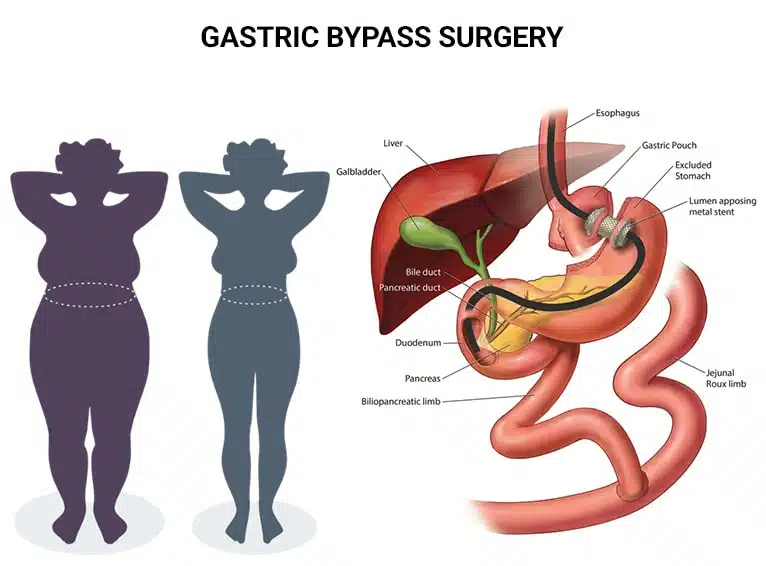Table of Contents

Gastric Bypass: Everything You Need to Know Before Your Surgery in Turkey
Over the last decade, Gastric Bypass in Turkey has become a game-changer for individuals struggling with obesity and related health issues. As a proven and effective weight-loss solution, it offers life-changing results for those who qualify. One of the leading destinations for affordable and high-quality bariatric procedures is gastric bypass Turkey, thanks to its modern clinics and experienced surgeons.
If you’re considering gastric bypass, this guide covers everything—from surgery types and preparation to recovery and cost comparisons. Let’s dive in.
Time in Turkey
7 to 14 days
Surgery Time
2 to 5 hours
Hospital Stay
1 to 3 days
Recovery
2 to 6 weeks
Accomodation
4/5* Hotels
Transportation
Private Driver
What is Gastric Bypass in Turkey?
Gastric Bypass in Turkey is a type of bariatric surgery that alters the digestive system to help patients lose significant weight. In this procedure, the stomach is divided into a small upper pouch and a larger lower section. The small pouch is then connected directly to the small intestine, bypassing part of the digestive tract.
This modification reduces food intake and decreases calorie absorption, leading to substantial and often permanent weight loss. It’s a preferred option for those who haven’t succeeded with diets, exercise, or medications.
Types of Gastric Bypass
There are two main types of Gastric Bypass in Turkey, both aimed at helping individuals achieve significant weight loss and improve health. The most common are the Roux-en-Y gastric bypass and the mini gastric bypass. Both procedures work by altering the digestive system to limit food intake and reduce nutrient absorption, though they differ in technique, risks, and outcomes. The choice between the two depends on the patient’s health, weight loss goals, and the surgeon’s recommendation. Understanding these differences helps patients make an informed decision on the best option for them:
1. Roux-en-Y Gastric Bypass (Standard)
- 1. Most commonly performed procedure
- 2. Creates a small stomach pouch and reroutes the intestines
- 3. High success rate in long-term weight loss
2. Mini Gastric Bypass – Fast & Effective
- 1. Simpler, quicker surgery with fewer complications
- 2. Only one connection (anastomosis) between the stomach and intestine
- 3. Shorter surgery time and recovery
Mini gastric bypass is increasingly popular due to its lower complication rate and ease of reversibility.
How Is Gastric Bypass Surgery Done in Turkey?
Gastric bypass surgery is one of the most effective bariatric (weight-loss) surgeries. It alters the stomach and small intestine to limit food intake and nutrient absorption, helping patients lose a significant amount of weight and improve obesity-related conditions.
Step-by-Step Procedure:
1. Pre-Op Evaluation
■ Comprehensive health check, including blood tests, imaging, and psychological evaluation
■ Consultation with a bariatric surgeon, nutritionist, and anesthesiologist
■ Medical clearance and tailored surgery plan
2. Anesthesia
■ The procedure is done under general anesthesia
■ You’ll be asleep and pain-free during the surgery
3. Surgical Process
■ The surgeon performs the procedure laparoscopically (keyhole surgery), which involves small incisions
■ The stomach is divided into two parts:
■ A small pouch (30–50 ml) is created to limit food intake
■ The rest of the stomach is bypassed
■ The small intestine is then connected to the pouch, reducing calorie and nutrient absorption
4. Duration and Hospital Stay
■ The surgery takes about 2–3 hours
■ Patients stay in the hospital for 2–4 days under observation
5. Post-Operative Care
■ You’ll begin a liquid diet, progressing to soft and then solid foods over several weeks
■ Regular follow-ups with a nutritionist and doctor
■ Vitamin and mineral supplements are usually required long-term
6. Results
■ Patients typically lose 60–80% of excess body weight within 12–18 months
■ Many experience remission of type 2 diabetes, sleep apnea, and hypertension
Why Choose Turkey for These Procedures?
■ Highly experienced plastic and bariatric surgeons
■ Internationally accredited clinics and hospitals
■ All-inclusive packages (treatment, 4–5-star hotel, airport transfers, translator)
■ Costs are 50–70% lower than in the US, UK, or Europe
■ Short waiting times and full travel support
Why is Turkey a Popular Destination for Gastric Bypass?
Over the past decade, Turkey has emerged as one of the world’s leading destinations for medical tourism—especially for bariatric procedures like Gastric Bypass in Turkey. Thousands of international patients choose to undergo surgery in Turkey each year, drawn by a combination of affordability, medical excellence, modern infrastructure, and tourism appeal. Here’s why Turkey stands out:
1. Affordable Prices Without Compromising Quality
One of the biggest reasons people travel to Turkey for gastric bypass surgery is the cost. Compared to countries like the USA, UK, or Canada, gastric bypass in Turkey can be up to 70% cheaper—even after including flights and accommodation. This cost advantage is due to lower operational expenses in Turkey, not lower standards.
2. Highly Qualified and Experienced Surgeons
Turkey is home to many internationally trained and board-certified bariatric surgeons with years of experience in performing gastric bypass surgeries. Many of them have trained or worked in Europe or North America and are members of global medical associations, ensuring top-tier expertise.
3. JCI-Accredited Hospitals and Clinics
Turkish hospitals and private clinics are equipped with state-of-the-art technology and maintain international accreditations, including JCI (Joint Commission International). These facilities adhere to strict hygiene, safety, and patient care protocols that match or exceed Western standards.
4. Comprehensive All-Inclusive Packages
Most clinics in Turkey offer all-inclusive packages that cover everything:
- 1. Surgeon’s fees
- 2. Hospital stay and medications
- 3. Pre-op tests and assessments
- 4. Airport transfers and hotel accommodation
- 5. Post-operative check-ups and dietary consultations
These packages offer peace of mind and clear, upfront pricing with no hidden costs, which is especially important for international patients.
5. Short Waiting Times
Unlike some countries where patients face months or even years of waiting for bariatric surgery (especially in public health systems), Turkey offers fast scheduling—often within a few weeks. This is ideal for patients looking for a timely solution to their health concerns.
6. English-Speaking Medical Staff and Coordinators
To accommodate the growing influx of international patients, most top bariatric clinics in Turkey employ English-speaking doctors, nurses, and patient coordinators. Communication is clear and smooth throughout your medical journey, from the initial consultation to post-op care.
7. High Success and Patient Satisfaction Rates
Turkish bariatric clinics boast high success rates and positive patient reviews, often supported by before-and-after photo galleries and testimonials. Many patients report smooth experiences, quick recoveries, and life-changing results.
8. Medical Tourism Infrastructure
Turkey’s healthcare system is well-integrated with its tourism sector. From VIP airport transfers to luxury recovery hotels, the country is well-prepared to make your entire stay comfortable and stress-free. Many clinics also assist with travel arrangements and documentation.
9. Cultural and Travel Opportunities
Turkey is a beautiful country that blends modern amenities with rich cultural heritage. Patients often combine their recovery with light tourism in iconic cities like Istanbul, Antalya, or Izmir. The availability of beautiful recovery environments, such as seaside hotels or scenic retreats, adds to the overall experience.
10. Strong Aftercare Support
Even after you return home, many Turkish clinics provide ongoing support through virtual follow-ups, nutritionist consultations, and direct messaging with patient coordinators. This helps maintain results and ensures a successful long-term outcome.
Befor & After Gastric Bypass in Turkey




Gastric Bypass Cost in Turkey vs. Other Countries
Gastric bypass surgery is a well-known weight-loss procedure that helps individuals with obesity achieve significant weight reduction by altering the digestive system. Turkey has become a top destination for gastric bypass surgery due to its high-quality healthcare services and lower costs compared to many Western countries. The cost of gastric bypass in Turkey :
Country | Average Cost (USD) |
Turkey | $3,500 – $5,000 |
USA | $15,000 – $25,000 |
UK | $10,000 – $15,000 |
Canada | $12,000 – $20,000 |
Germany | $8,000 – $13,000 |
How much is gastric bypass surgery? In Turkey, significantly less—with no compromise on quality.
Choosing the Right Clinic and Surgeon
Selecting the right clinic and surgeon for Gastric Bypass in Turkey is just as important as the procedure itself. Your choice can directly influence your safety, comfort, recovery time, and long-term weight loss success. When seeking treatment abroad, especially in a popular medical tourism destination like Turkey, careful research and clear decision-making are essential.
Below are key factors to consider when choosing a clinic and surgeon for gastric bypass surgery in Turkey:
1. Surgeon’s Qualifications and Experience
Your surgeon’s credentials matter. Look for:
- 1. Board certification in bariatric or general surgery
- 2. 10+ years of experience specifically in gastric bypass and other weight-loss procedures
- 3. Membership in recognized professional organizations such as:
- 1. IFSO (International Federation for the Surgery of Obesity and Metabolic Disorders)
- 2. ASMBS (American Society for Metabolic and Bariatric Surgery)
Also, don’t hesitate to ask:
- 1. How many gastric bypass procedures have you performed?
- 2. What is your complication rate?
- 3. Can I see patient reviews or before-and-after photos?
A skilled, experienced surgeon will be transparent and happy to share their track record.
2. Accreditation of the Clinic or Hospital
Ensure the medical facility is:
- 1. Internationally accredited, preferably by JCI (Joint Commission International)
- 2. Licensed by Turkey’s Ministry of Health
- 3. Regularly audited for patient safety, hygiene, and equipment standards
These accreditations guarantee a safe and sterile surgical environment with adherence to international protocols.
3. Comprehensive and Transparent Packages
Top-tier clinics in Turkey usually offer all-inclusive packages for international patients. Look for packages that cover:
- 1. Pre-op consultations and diagnostic tests
- 2. Surgery and anesthesia costs
- 3. Hospital stay (2–3 days minimum)
- 4. Post-op medications and garments
- 5. Airport-hotel-clinic transfers
- 6. Hotel accommodation (3–5 nights)
- 7. Post-op dietary advice and follow-up consultations
Make sure the total cost is clearly outlined with no hidden fees. The clinic should explain everything before you commit.
4. English-Speaking Staff and Patient Coordinators
Good communication is key to a smooth medical experience. Your chosen clinic should provide:
- 1. Fluent English-speaking coordinators
- 2. Access to English-speaking nurses, doctors, and nutritionists
- 3. 24/7 assistance during your stay in Turkey
Having a dedicated coordinator to guide you from consultation to post-op care makes a big difference—especially when navigating a foreign healthcare system.
5. Strong Online Reputation
Reputation matters. Before making a final decision, research the clinic’s:
- 1. Google reviews
- 2. Trustpilot scores
- 3. Social media presence and testimonials
- 4. Patient forums and Facebook groups for real, unfiltered opinions
Look for clinics with consistent positive feedback on care quality, surgeon professionalism, and patient satisfaction.
6. Post-Surgery Aftercare
Successful gastric bypass surgery doesn’t end when you leave the hospital. Look for clinics that offer:
- 1. Free or affordable virtual follow-ups
- 2. Long-term access to a dietitian or nutritionist
- 3. Guidance on supplements and lifestyle changes
- 4. Emergency contact access for urgent concerns after your return home
A good clinic should be invested in your long-term results, not just the operation.
7. Customization and Patient-Centered Approach
You are not just another number. A high-quality clinic will:
- 1. Take time to understand your medical history and weight-loss goals
- 2. Offer personalized surgery options (e.g., choosing between Roux-en-Y and Mini Gastric Bypass)
- 3. Help you make informed decisions, not rush or pressure you
Patient-focused care builds trust and enhances outcomes.
8. Clean, Modern Facilities
Ensure the clinic offers:
- 1. Modern surgical theaters with advanced laparoscopic equipment
- 2. Comfortable patient rooms with private bathrooms
- 3. On-site diagnostic tools (labs, imaging, etc.)
- 4. Hotel-like recovery environments for a pleasant stay
A quick video tour or photo gallery on the clinic’s website or social media can give insight into its cleanliness and quality.
9. Legal and Ethical Transparency
Reputable clinics in Turkey should:
- 1. Provide a written consent form and contract in English
- 2. Respect patient confidentiality
- 3. Allow you to ask legal or medical questions freely
If something feels unclear or rushed, that’s a red flag.
What to Look for in a Gastric Bypass Clinic
Criteria | Details |
Certifications | Must be internationally accredited |
Experienced Surgeons | At least 10+ years in bariatric surgery |
Comprehensive Packages | Include accommodation, transfers, tests |
Post-Op Support | Free consultations and dietitian support after return |
Questions to Ask Your Surgeon Before the Procedure
- 1. What is your success rate with gastric bypass surgeries?
- 2. How many procedures have you performed?
- 3. What complications should I be aware of?
- 4. What is included in the package?
- 5. What does post-op care involve?
How to Book Gastric Bypass in Turkey
Booking a gastric bypass surgery in Turkey is a smooth and straightforward process, thanks to the country’s advanced medical infrastructure and dedicated international patient services. Turkey is known for offering high-quality bariatric procedures at affordable prices, with English-speaking staff and all-inclusive packages. Here’s a step-by-step guide to help you book your gastric bypass with confidence:
Step 1: Research Reputable Clinics and Surgeons
Begin by looking for certified bariatric clinics or hospitals in major Turkish cities like Istanbul, Ankara, Antalya, or Izmir. Focus on:
■ Board-certified bariatric surgeons with international experience
■ Clinics accredited by organizations like JCI (Joint Commission International)
■ Verified patient reviews on platforms like Trustpilot, Google, or RealSelf
■ Transparency about procedure details, risks, and pricing
■ All-inclusive medical tourism packages
Step 2: Request a Free Online Consultation
Most reputable Turkish clinics offer free virtual consultations through WhatsApp, email, or Zoom. During the consultation:
■ You’ll be asked to fill out a medical questionnaire
■ Share your BMI, weight history, and any existing health conditions
■ The surgeon will assess your eligibility for gastric bypass surgery
■ You’ll be guided on how the procedure works, expected results, and recovery
Step 3: Get Your Personalized Treatment Plan and Quote
After your consultation, the clinic will provide:
■ A customized treatment plan
■ An all-inclusive quote covering:
■ Surgeon’s fees
■ Hospital stay (2–4 nights)
■ Pre-operative tests
■ Medications and aftercare
■ 4- or 5-star hotel (before/after surgery)
■ Airport transfers and interpreter support
■ Optional extras like VIP packages or extended stays
Compare offers from 2–3 clinics before making your final decision.
Step 4: Confirm Your Surgery Date and Make a Deposit
Once you’ve chosen a clinic:
■ Confirm your surgery date with the medical coordinator
■ Pay a deposit if required to secure your booking
■ Share your passport details for travel coordination
■ Receive your full itinerary and checklist (travel, fasting before surgery, required documents, etc.)
Some clinics also assist with visa applications if needed.
Step 5: Travel to Turkey and Undergo Surgery
When you arrive in Turkey:
■ A driver from the clinic will pick you up at the airport
■ You’ll be taken to your hotel or directly to the hospital
■ A series of pre-operative tests (blood work, ECG, ultrasound) will be done
■ The surgeon will meet with you in person for a final consultation
■ Surgery is usually performed the next day
You’ll stay in the hospital for 2–4 days, with nurses and doctors monitoring your recovery.
Step 6: Post-Op Care and Follow-Up
After being discharged:
■ You’ll stay in Turkey for 7–10 days total, depending on your condition
■ Receive a diet plan from a nutritionist
■ Take home medications and supplements
■ Get instructions for long-term follow-up (in-person or online)
Many clinics offer lifetime follow-up support via email or teleconsultation.
Why Book Gastric Bypass in Turkey?
■ High success rates and internationally trained surgeons
■ State-of-the-art hospitals and equipment
■ Affordable prices—up to 70% less than in the US or UK
■ Seamless care from airport pick-up to post-op recovery
Benefits of Gastric Bypass
Gastric Bypass in Turkey offers a wide array of benefits that go far beyond just weight loss. For many patients, it’s a life-saving and life-enhancing procedure that significantly improves both physical and mental health. Below are the key advantages:
1. Significant and Sustained Weight Loss
Most patients lose between 60–80% of their excess weight within the first 12–24 months. This is often maintained long-term, especially when combined with a healthy lifestyle and regular follow-up care.
2. Resolution or Improvement of Obesity-Related Conditions
Gastric bypass has a positive impact on numerous health issues, such as:
- 1. Type 2 Diabetes: Many patients experience remission or a dramatic reduction in medication needs.
- 2. High Blood Pressure (Hypertension): Often improves or resolves completely.
- 3. Sleep Apnea: Weight loss can eliminate the need for CPAP machines and improve sleep quality.
- 4. Heart Disease Risk: Lower cholesterol levels and improved blood sugar control reduce cardiovascular risks.
- 5. Joint Pain: Decreased weight relieves stress on joints, reducing chronic pain and the need for orthopedic interventions.
3. Enhanced Quality of Life
After surgery, many patients report:
- 1. Improved mobility and energy levels
- 2. Better social interactions and confidence
- 3. Increased participation in daily activities
- 4. More comfortable travel and clothing options
4. Positive Impact on Mental Health
Obesity often takes a toll on self-esteem and emotional wellbeing. Gastric bypass patients often experience:
- 1. Reduced symptoms of depression and anxiety
- 2. Improved self-image and body confidence
- 3. Greater motivation to maintain healthier habits
5. Longevity and Disease Prevention
Studies show that gastric bypass can:
- 1. Extend life expectancy by reducing the risks of life-threatening conditions
- 2. Prevent progression of diseases such as fatty liver disease and kidney problems
6. Hormonal and Metabolic Changes
The surgery triggers favorable hormonal shifts:
- 1. Improved satiety signals (you feel full sooner)
- 2. Better insulin sensitivity, aiding in diabetes management
- 3. Reduction in hunger hormones like ghrelin
Risks and Potential Side Effects
Although Gastric Bypass in Turkey is generally safe, especially in experienced hands, it remains a major surgery and comes with potential risks and complications. Being informed allows patients to recognize symptoms early and seek appropriate care.
1. Surgical Complications
These may include:
- 1. Bleeding or infection
- 2. Anastomotic leaks (where the intestine is joined to the stomach)
- 3. Blood clots, which may lead to deep vein thrombosis or pulmonary embolism
- 4. Adverse reactions to anesthesia
These are rare but serious. Most reputable Turkish clinics have very low complication rates thanks to skilled surgical teams and rigorous safety protocols.
2. Nutritional Deficiencies
Since part of the digestive system is bypassed, the body absorbs fewer nutrients. Without proper supplementation and monitoring, deficiencies can develop in:
- 1. Iron (leading to anemia)
- 2. Vitamin B12
- 3. Folate
- 4 Calcium and Vitamin D (increasing the risk of osteoporosis) Patients must take lifelong supplements and undergo regular blood tests to avoid these issues.
3. Dumping Syndrome
This occurs when food moves too quickly into the small intestine and can cause:
- 1. Nausea
- 2. Diarrhea
- 3. Dizziness or faintness
- 4. Abdominal cramps Avoiding high-sugar and high-fat foods typically prevents this syndrome.
4. Gallstones and Kidney Stones
Rapid weight loss increases the risk of developing gallstones or kidney stones. Surgeons may prescribe preventive medications or recommend gallbladder removal in some cases.
5. Psychological and Emotional Challenges
Some patients may struggle with:
- 1. Food addiction or disordered eating patterns
- 2. Unrealistic expectations regarding body image
- 3. Post-surgical depression or anxiety Support from psychologists or support groups can help during the adjustment period.
6. Bowel Changes
Patients may notice:
- 1. Increased gas or bloating
- 2. Irregular bowel movements
- 3. Food intolerances (especially to sugar, dairy, or high-fat meals)
Is Gastric Bypass Safe?
Yes, when performed by experienced surgeons, Gastric Bypass in Turkey is generally safe. Turkey is known for its medical tourism infrastructure and certified bariatric centers that follow strict international standards.
Success and safety depend heavily on the patient’s adherence to post-op guidelines.
Pre-Surgery Preparations
Getting ready for Gastric Bypass in Turkey involves several key steps to ensure a smooth procedure. You will have a consultation with your surgeon to discuss your health and the specifics of the surgery, followed by pre-operative tests like blood work. Instructions on fasting, medication adjustments, and lifestyle changes (such as avoiding smoking and alcohol) will be provided. It’s also important to arrange for someone to accompany you and help with recovery. Proper preparation helps ensure the procedure goes smoothly and supports a quicker recovery:
- 1. Medical Tests: Blood work, ECG, and imaging.
- 2. Nutritional Counseling: High-protein, low-carb pre-op diet.
- 3. Mental Readiness: Psychological evaluation may be required.
- 4. Lifestyle Changes: Cease smoking and limit alcohol intake.
What to Expect on the Day of Surgery
- 1. Admission: Early check-in and final pre-surgery brief
- 2. Anesthesia: General anesthesia is administered
- 3. Procedure Time: Usually 1–2 hours
- 4. Hospital Stay: 2–3 days for monitoring
- 5. First Steps: Walking encouraged within 24 hours
The process is swift, efficient, and typically laparoscopic, ensuring smaller incisions and quicker recovery.
Post-Surgery Recovery and Care
Recovery occurs in stages:
- 1. Week 1–2: Liquid diet
- 2. Week 3–4: Soft foods introduced
- 3. 1–3 Months: Gradual return to normal foods
- 4. Ongoing: Vitamin supplementation and follow-ups
Support from nutritionists and bariatric teams in Turkey makes this process smoother for international patients.
How Long Do the Results Last?
With dedication, gastric bypass surgery offers lifelong results. Patients must adopt:
- 1. A healthy diet
- 2. Regular physical activity
- 3. Psychological support when needed
Weight regain is possible but minimal if lifestyle changes are maintained.
Gastric Bypass in Turkey FAQs
Who qualifies for gastric bypass surgery?
People with a BMI over 40, or over 35 with related conditions like diabetes or hypertension.
What’s the difference between gastric sleeve vs gastric bypass?
Gastric sleeve removes a portion of the stomach, while gastric bypass reroutes the intestines. The latter often leads to greater weight loss.
Can I get pregnant after gastric bypass?
Yes, but it’s advised to wait 12–18 months post-surgery for a healthy pregnancy.
How long is the hospital stay in Turkey?
Typically 2–3 days, followed by hotel recovery with medical supervision.
Will I need to take vitamins forever?
Yes, to avoid deficiencies in iron, calcium, B12, and other key nutrients.
Is the mini gastric bypass reversible?
Yes, unlike the standard gastric bypass, the mini version is easier to reverse.
How much weight will I lose after gastric bypass?
On average, patients lose about 60–80% of their excess body weight within the first 12–24 months. Actual results may vary based on lifestyle habits, age, and metabolism.
Is gastric bypass surgery painful?
The surgery is typically performed laparoscopically, meaning smaller incisions and less post-op pain. Discomfort is usually mild to moderate and well managed with prescribed medications. Most patients start walking the next day.
How soon can I return to work after the procedure?
Most people return to work within 2–3 weeks, depending on their job type and how well they’re recovering. Jobs involving physical labor may require more time off.




